William Edward Boeing, born in 1881, was an aviation pioneer and manufacturer of iconic aircraft such as B-17, B-29 and B-52.
After leaving Yale University without graduating, he ventured into lumber business before developing a keen interest in aviation.
This interest led him to found Pacific Aero Products Company, later known as Boeing Airplane Company.
Boeing’s company, through strategic mergers and acquisitions, grew into a profitable aviation enterprise, manufacturing and supplying aircraft for commercial and military purposes.
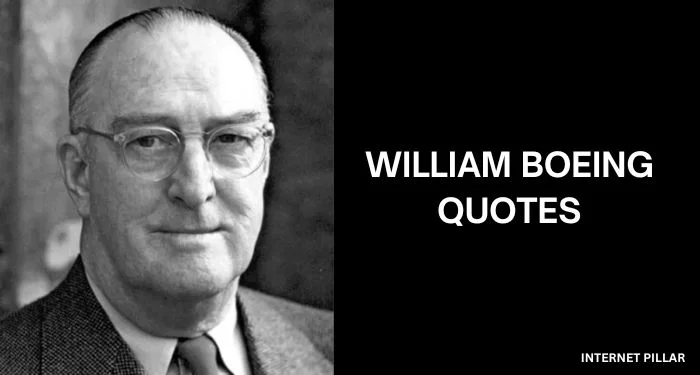
However, the company’s prosperity was interrupted by the U.S. government’s antitrust action in the mid-1930s, which led to its breakup into Boeing Aircraft, United Aircraft and United Airlines.
Displeased by this, Boeing withdrew from active participation in the company.
Despite this setback, the company thrived, particularly during World War II, with several Boeing planes playing instrumental roles in the war.
Related: John Deere Quotes and Enzo Ferrari Quotes.
Post-war, the company remained successful, continuing to develop popular commercial airplanes such as the Boeing 707, 727, 747 and 777.
William Boeing’s remarkable journey encapsulates his enduring legacy in aviation and business.
I have made a list of the best quotes from William Boeing in this article.
Best William Boeing Quotes
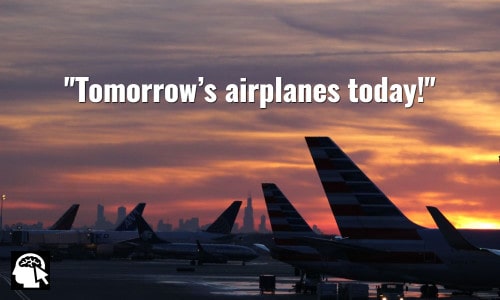
Tomorrow’s airplanes today! ~ William Boeing.

We have already proved that science and hard work can lick what appear to be insurmountable difficulties. ~ William Boeing.
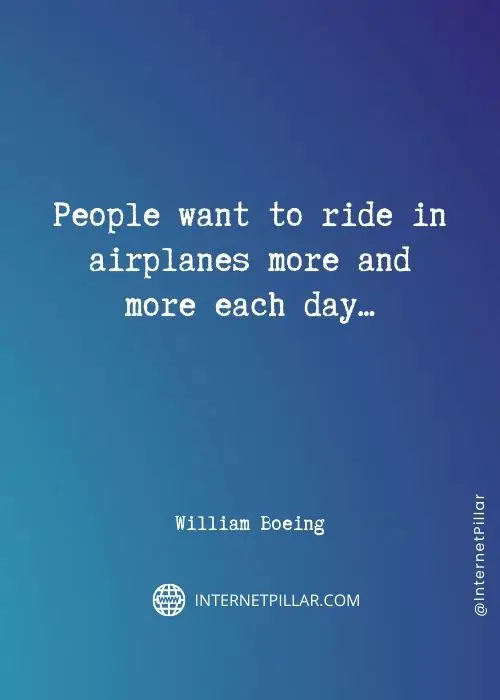
People want to ride in airplanes more and more each day… ~ William Boeing.
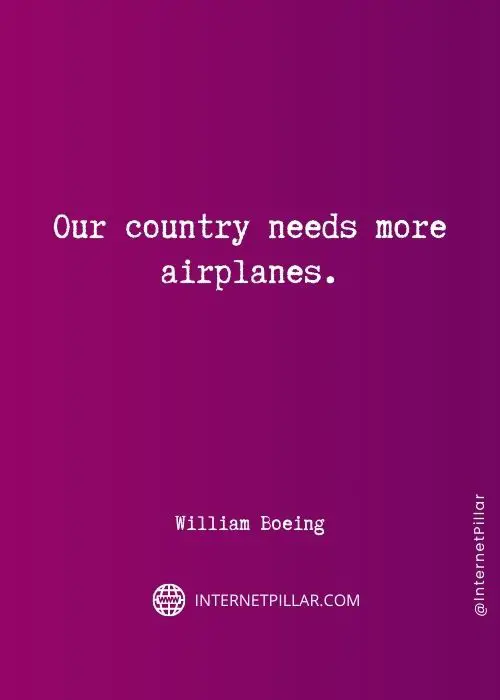
Our country needs more airplanes. ~ William Boeing.
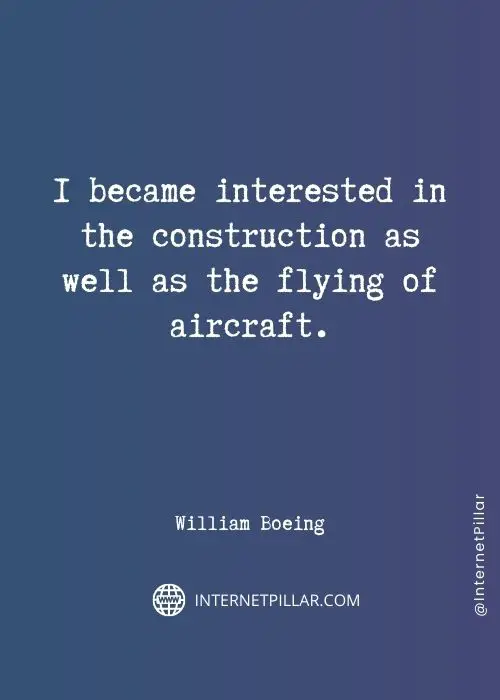
I became interested in the construction as well as the flying of aircraft. ~ William Boeing.
Famous William Boeing Quotes
It now behooves us to devote our energies toward the development of machines which will be used in peacetimes. In this connection the first logical opening will be the development of a commercial flying boat. ~ Bill Boeing.
Boeing has always built tomorrow’s airplanes today! ~ William Boeing.
We could build a better plane ourselves and build it faster. ~ William Boeing.
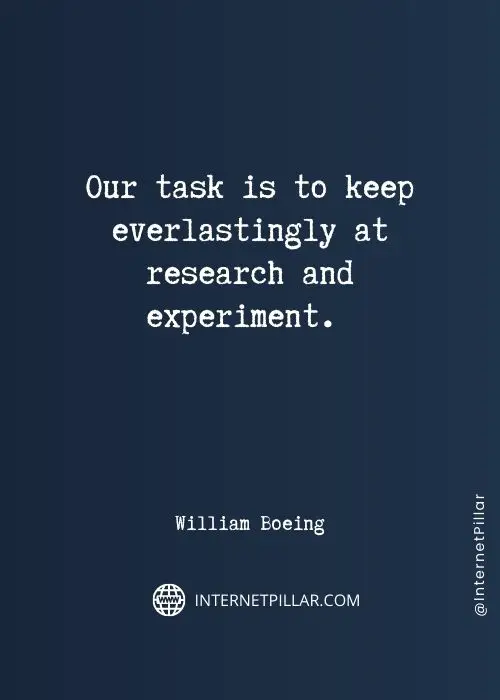
Our task is to keep everlastingly at research and experiment. ~ William Boeing.
Top William Boeing Quotes
Within the short space of 12 years, an infant company with a personnel of less than a dozen men, has grown to be the largest plant in America. ~ William Boeing.
Let no new improvement in flying and flying equipment pass us by. ~ William Boeing.
Our job is to keep everlastingly at research and experiment, to adapt our laboratories to production as soon as practicable, to let no new improvement in flying and flying equipment pass us by. ~ William Boeing.
Short Biography of William Boeing
William Boeing, an American aviation pioneer, founded the Pacific Airplane Company in 1916, later renamed Boeing, now a leading aerospace manufacturer.
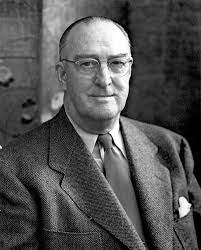
Born in Detroit to immigrant parents, he lost his father early and was educated in Switzerland and the U.S.
Boeing ventured into lumber before developing a keen interest in aviation, leading to his first aircraft design, the B & W Seaplane.
| Full Name | William Edward Boeing |
| Born | 1 October 1881, Detroit, Michigan, United States |
| Died | 28 September 1956 (age 74 years), Puget Sound, Washington, United States |
| Citizenship | American |
| Spouse | Bertha M. Potter Paschall Boeing (m. 1921) |
| Children | William E. Boeing Jr. |
| Occupation | Industrialist |
| Organizations founded | Boeing Co, MORE |
| Education | Sheffield Scientific School, Yale University |
| Parents | Marie Boeing, Wilhelm Boeing |
| Award | Daniel Guggenheim Medal (1934) |
He played a significant role in founding United Airlines and was honored for his contributions to aviation.
Boeing’s personal life included marriage to Bertha Marie Potter Paschall and a step into aviation manufacturing for his family.
Quick Facts about William Boeing
- William Boeing was born in Detroit, Michigan on October 1, 1881.
- His father, Wilhelm Böing, emigrated from Germany to the United States in 1868.
- Boeing attended school in Switzerland and later a prep school near Boston.
- He dropped out of Yale University to enter the lumber business.
- Boeing became interested in aviation after attending the Alaska-Yukon-Pacific Exposition in 1909.
- He took flying lessons and bought his first plane from Glenn L. Martin.
- Boeing founded the Pacific Airplane Company in 1916, later renamed Boeing.
- The first Boeing aircraft was the Model 1 (B & W Seaplane), flown in 1916.
- Boeing helped establish United Aircraft and Transport Corporation, now known as United Airlines, in 1929.
- He was awarded the Daniel Guggenheim Medal in 1934 for his contributions to aviation.
- William Boeing was inducted into the National Aviation Hall of Fame in 1966.
- Boeing’s first international airmail flight was in 1919, from Canada to the U.S.
- Boeing married Bertha Marie Potter Paschall in 1921, adding two stepsons to his family.
- His stepsons pursued careers in aviation manufacturing.
- In 1929, Boeing formed United Aircraft and Transport Corporation with Frederick Rentschler.
- The U.S. government’s 1934 Air Mail Act led Boeing to divest his aviation holdings.
- Boeing then focused on property development and horse breeding.
- He set aside land in Seattle for development, with racially restrictive covenants.
- Boeing’s primary residence was in The Highlands, near Seattle.
- He participated in the rollout of the Boeing 367-80 prototype in 1954.
- Boeing died on September 28, 1956, at the age of 74.
- His ashes were scattered off the coast of British Columbia.
- Boeing was inducted into the International Air & Space Hall of Fame in 1984.
- The Museum of Flight in Seattle holds his archival collection.
- Boeing’s company is now the largest aerospace manufacturer globally and the biggest U.S. exporter by dollar value.
- His father made a fortune in the North Woods timber lands and iron ore.
- Boeing’s interest in aviation was sparked by his inability to get a plane ride at a flying meet.
- Boeing’s venture into aircraft manufacturing was prompted by a delay in getting plane parts.
- United Airlines originated from the consolidation of several small airlines by Boeing.
- Boeing’s estate, Aldarra, was developed into a golf course residential community after his death.
Top Questions about William Boeing
A: William Boeing was recognized in the Aviation Hall of Fame for his significant contributions to aviation, which include establishing a network of airline routes and producing crucial military and commercial aircraft.
A: Boeing is owned by institutional investors, with major stakeholders being The Vanguard Group, BlackRock, and individuals such as Timothy J. Keating and Leanne G.
A: The first Boeing product was the Boeing Model 1, also known as the B & W Seaplane, a single-engine biplane seaplane designed by William Boeing and Lt. Conrad Westervelt.
A: Boeing was named after its founder, William E. Boeing, who started the company in 1916 following his collaboration with U.S. Navy officer Conrad Westervelt in developing the B&W seaplane.
A: Yes, Boeing is a patronymic surname of Welsh origin, derived from the personal name Owen or Owein. It originally included the prefix “ab” or “ap,” which means “son of,” but this prefix has merged into the surname over time.
A: Boeing’s revenue comes from producing commercial and military aircraft, weapons systems, strategic defense and intelligence systems, and offering related services. The Defense, Space, and Security division is now the largest source of revenue for Boeing, with the U.S. government being one of its biggest clients.
Q: What led to William Boeing’s venture into the aviation industry?
A: William Boeing’s interest in aviation was sparked when he attended the Alaska-Yukon-Pacific Exposition in 1909 and saw a manned flying machine for the first time. His passion deepened after attending the Dominguez Flying Meet in 1910, despite being initially denied a plane ride by several pilots.
A: Before entering the aviation industry, Boeing was successful in the lumber business, utilizing the Panama Canal to ship lumber to the East Coast. This success provided him with the financial resources to pursue his interest in aviation.
A: Faced with a long wait for replacement parts for his damaged plane, Boeing decided to build a better aircraft himself, leading to the creation of the B & W Seaplane with Commander George Conrad Westervelt.
A: Boeing Aircraft was founded in 1916 as Pacific Aero Products Co., after Boeing and Westervelt built the successful B & W Seaplane. The company’s name changed to Boeing Airplane Company in 1917, aligning with the U.S. entering World War I and Boeing’s shift to manufacturing military aircraft.
A: Boeing contributed to commercial aviation by partnering with Eddie Hubbard in 1919 to deliver the first international airmail from Canada to the U.S., showcasing the potential of air transport for mail delivery.
A: Boeing’s marriage to Bertha Marie Potter Paschall connected him to influential families, potentially providing a network beneficial to his aviation business. His stepsons also pursued careers in aviation, indicating the influence of Boeing’s interests on his family.
A: The United Aircraft and Transport Corporation, formed by Boeing and Frederick Rentschler, was dismantled in 1934 due to government accusations of monopolistic practices, leading to the separation of aircraft manufacturing from airline operations.
A: After divesting from the aviation industry, Boeing focused on property development and thoroughbred horse breeding. He also prepared for potential wartime threats by purchasing a large farm east of Seattle, reflecting his shift from aviation to other ventures.



